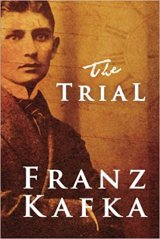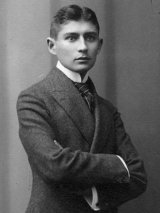The Trial Page #11
The Trial is a novel written by Franz Kafka between 1914 and 1915 and published posthumously on 26 April 1925. One of his best-known works, it tells the story of Josef K., a man arrested and prosecuted by a remote, inaccessible authority, with the nature of his crime revealed neither to him nor to the reader. Heavily influenced by Dostoevsky's Crime and Punishment and The Brothers Karamazov, Kafka even went so far as to call Dostoevsky a blood relative. Like Kafka's other novels, The Trial was never completed, although it does include a chapter which appears to bring the story to an intentionally abrupt ending.
K. thought he had stepped into a meeting. A medium sized, two windowed room was filled with the most diverse crowd of people - nobody paid any attention to the person who had just entered. Close under its ceiling it was surrounded by a gallery which was also fully occupied and where the people could only stand bent down with their heads and their backs touching the ceiling. K., who found the air too stuffy, stepped out again and said to the young woman, who had probably misunderstood what he had said, "I asked for a joiner, someone by the name of Lanz." "Yes," said the woman, "please go on in." K. would probably not have followed her if the woman had not gone up to him, taken hold of the door handle and said, "I'll have to close the door after you, no-one else will be allowed in." "Very sensible," said K., "but it's too full already." But then he went back in anyway. He passed through between two men who were talking beside the door - one of them held both hands far out in front of himself making the movements of counting out money, the other looked him closely in the eyes - and someone took him by the hand. It was a small, red-faced youth. "Come in, come in," he said. K. let himself be led by him, and it turned out that there was - surprisingly in a densely packed crowd of people moving to and fro - a narrow passage which may have been the division between two factions; this idea was reinforced by the fact that in the first few rows to the left and the right of him there was hardly any face looking in his direction, he saw nothing but the backs of people directing their speech and their movements only towards members of their own side. Most of them were dressed in black, in old, long, formal frock coats that hung down loosely around them. These clothes were the only thing that puzzled K., as he would otherwise have taken the whole assembly for a local political meeting. At the other end of the hall where K. had been led there was a little table set at an angle on a very low podium which was as overcrowded as everywhere else, and behind the table, near the edge of the podium, sat a small, fat, wheezing man who was talking with someone behind him. This second man was standing with his legs crossed and his elbows on the backrest of the chair, provoking much laughter. From time to time he threw his arm in the air as if doing a caricature of someone. The youth who was leading K. had some difficulty in reporting to the man. He had already tried twice to tell him something, standing on tip- toe, but without getting the man's attention as he sat there above him. It was only when one of the people up on the podium drew his attention to the youth that the man turned to him and leant down to hear what it was he quietly said. Then he pulled out his watch and quickly looked over at K. "You should have been here one hour and five minutes ago," he said. K. was going to give him a reply but had no time to do so, as hardly had the man spoken than a general muttering arose all over the right hand side of the hall. "You should have been here one hour and five minutes ago," the man now repeated, raising his voice this time, and quickly looked round the hall beneath him. The muttering also became immediately louder and, as the man said nothing more, died away only gradually. Now the hall was much quieter than when K. had entered. Only the people up in the gallery had not stopped passing remarks. As far as could be distinguished, up in the half-darkness, dust and haze, they seemed to be less well dressed than those below. Many of them had brought pillows that they had put between their heads and the ceiling so that they would not hurt themselves pressed against it. K. had decided he would do more watching than talking, so he did not defend himself for supposedly having come late, and simply said, "Well maybe I have arrived late, I'm here now." There followed loud applause, once more from the right hand side of the hall. Easy people to get on your side, thought K., and was bothered only by the quiet from the left hand side which was directly behind him and from which there was applause from only a few individuals. He wondered what he could say to get all of them to support him together or, if that were not possible, to at least get the support of the others for a while. "Yes," said the man, "but I'm now no longer under any obligation to hear your case" - there was once more a muttering, but this time it was misleading as the man waved the people's objections aside with his hand and continued - "I will, however, as an exception, continue with it today. But you should never arrive late like this again. And now, step forward!" Someone jumped down from the podium so that there would be a place free for K., and K. stepped up onto it. He stood pressed closely against the table, the press of the crowd behind him was so great that he had to press back against it if he did not want to push the judge's desk down off the podium and perhaps the judge along with it. The judge, however, paid no attention to that but sat very comfortably on his chair and, after saying a few words to close his discussion with the man behind him, reached for a little note book, the only item on his desk. It was like an old school exercise book and had become quite misshapen from much thumbing. "Now then," said the judge, thumbing through the book. He turned to K. with the tone of someone who knows his facts and said, "you are a house painter?" "No," said K., "I am the chief clerk in a large bank." This reply was followed by laughter among the right hand faction down in the hall, it was so hearty that K. couldn't stop himself joining in with it. The people supported themselves with their hands on their knees and shook as if suffering a serious attack of coughing. Even some of those in the gallery were laughing. The judge had become quite cross but seemed to have no power over those below him in the hall, he tried to reduce what harm had been done in the gallery and jumped up threatening them, his eyebrows, until then hardly remarkable, pushed themselves up and became big, black and bushy over his eyes.
Translation
Translate and read this book in other languages:
Select another language:
- - Select -
- 简体中文 (Chinese - Simplified)
- 繁體中文 (Chinese - Traditional)
- Español (Spanish)
- Esperanto (Esperanto)
- 日本語 (Japanese)
- Português (Portuguese)
- Deutsch (German)
- العربية (Arabic)
- Français (French)
- Русский (Russian)
- ಕನ್ನಡ (Kannada)
- 한국어 (Korean)
- עברית (Hebrew)
- Gaeilge (Irish)
- Українська (Ukrainian)
- اردو (Urdu)
- Magyar (Hungarian)
- मानक हिन्दी (Hindi)
- Indonesia (Indonesian)
- Italiano (Italian)
- தமிழ் (Tamil)
- Türkçe (Turkish)
- తెలుగు (Telugu)
- ภาษาไทย (Thai)
- Tiếng Việt (Vietnamese)
- Čeština (Czech)
- Polski (Polish)
- Bahasa Indonesia (Indonesian)
- Românește (Romanian)
- Nederlands (Dutch)
- Ελληνικά (Greek)
- Latinum (Latin)
- Svenska (Swedish)
- Dansk (Danish)
- Suomi (Finnish)
- فارسی (Persian)
- ייִדיש (Yiddish)
- հայերեն (Armenian)
- Norsk (Norwegian)
- English (English)
Citation
Use the citation below to add this book to your bibliography:
Style:MLAChicagoAPA
"The Trial Books." Literature.com. STANDS4 LLC, 2025. Web. 24 Feb. 2025. <https://www.literature.com/book/the_trial_1052>.








Discuss this The Trial book with the community:
Report Comment
We're doing our best to make sure our content is useful, accurate and safe.
If by any chance you spot an inappropriate comment while navigating through our website please use this form to let us know, and we'll take care of it shortly.
Attachment
You need to be logged in to favorite.
Log In